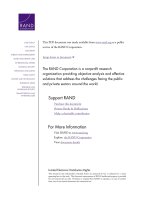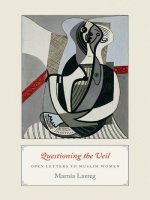yale university press knowing the enemy jihadist ideology and the war on terror jan 2006
Bạn đang xem bản rút gọn của tài liệu. Xem và tải ngay bản đầy đủ của tài liệu tại đây (818.08 KB, 252 trang )
Knowing the Enemy
Knowing
the
Enemy
Jihadist Ideology and the War on Terror
Mary R. Habeck
yale university press new haven & london
Copyright © 2006 by Yale University.
All rights reserved.
This book may not be reproduced, in whole or in part, including illustrations,
in any form (beyond that copying permitted by Sections 107 and 108 of
the U.S. Copyright Law and except by reviewers for the public press),
without written permission from the publishers.
Designed by Rebecca Gibb.
Set in Janson text type by Integrated Publishing Solutions.
Printed in the United States of America.
Library of Congress Cataloging-in-Publication Data
Habeck, Mary R.
Knowing the enemy : jihadist ideology and the War on Terror / Mary R. Habeck.
p. cm.
Includes bibliographical references and index.
ISBN 0-300-11306-4 (hardcover : alk. paper)
1. Terrorism—Religious aspects—Islam. 2. Islam and world politics. 3.War
on Terrorism, 2001–. I. Title.
BP190.5.T47H33 2006
297.2Ј72—dc22 2005015210
A catalogue record for this book is available from the British Library.
The paper in this book meets the guidelines for permanence and durability
of the Committee on Production Guidelines for Book Longevity
of the Council on Library Resources.
10987654321
Contents
1 Why They Did It 1
2 Historical Context 17
3 The Qur’an Is Our Constitution 41
4 Our ‘Aqida 57
5 The Clash of Civilizations, Part I:
The American Campaign to Suppress Islam 83
6 The Clash of Civilizations, Part II:
Jihad on the Path of God 107
7 From Mecca to Medina:
Following the Method of Muhammad 135
8 Jihadist Ideology and the War on Terror 161
notes 179
glossary 233
index 237
Contents
vi
Knowing the Enemy
Immediately after September 11, 2001, Americans agonized
over the reason why nineteen men hated the United States
enough to kill three thousand civilians in an unprovoked assault.
The list of explanations offered by analysts and scholars was
long and varied—U.S. policies in the Middle East (most espe-
cially America’s support for Israel), globalization, U.S. arro-
gance, imperialism (cultural, political, and economic), and the
poverty and oppression endemic in many Arab countries were all
blamed as the root causes for the attacks. Other observers, like
President George W. Bush, argued that it was the very existence
of the United States that led to the attacks. In this view certain
nations and people fear and envy what they do not have for
themselves—the freedoms, democracy, power, and wealth of the
1
United States—and this alone is enough to explain why the
towers had to fall.
Among all these explanations the one voice missing was that
of the attackers themselves: what were the reasons that they gave
for the attack? Their deaths should not prevent us from listening
to them, because they belong to a larger extremist group that has
not been shy about sharing its views with the entire world. To
understand “why they hate us” we therefore need first to know
where to look and who listen to: our first question must not be
“why do they hate America?” but “who is it that hates America
enough to kill?” Not all Arabs and not all Muslims chose to carry
out the attacks, but rather a particular type of militant with
specific views about a need to resort to violence. Knowing who
these people are, and what their views are, we will then be able to
hear what they themselves say and why they decided to kill as
many Americans as possible that September day.
Any answer to this initial question must acknowledge the fact
that the hijackers were Muslims and that al-Qaida, the group
they were associated with, claimed to carry out the attacks in the
name of Islam. But we must be clear about the relationship be-
tween these men and the religion of Islam. Just as not all Mus-
lims deliberately murdered three thousand innocents in New
York City, Washington, D.C., and rural Pennsylvania, it would
also be misguided—even evil—to suggest that all Muslims de-
sired the deaths that happened that day. Indeed, though demon-
strations in support of the hijackers and protests against U.S.
Why They Did It
2
policies have occurred since, the “Muslim street” has not risen,
taken up arms, and attacked America. The few thousand extrem-
ists who are fighting U.S. troops in Afghanistan and Iraq pale in
comparison to the bloodshed that would occur if the entire Is-
lamic community decided to kill Americans.
Yet it would be just as wrong to conclude that the hijackers, al-
Qaida, and the other radical groups have nothing to do with
Islam. As we shall see, these extremists explicitly appeal to the
holy texts (the Qur’an and sunna, as laid out in the hadith) to
show that their actions are justified. They find, too, endorsement
of their ideas among respected interpreters of Islam and win dis-
ciples by their piety and their sophisticated arguments about
how the religion supports them. The question is which Islam they
represent. As the religion of over a billion people, Islam does not
present a united face, and it is practiced in a variety of ways: syn-
cretistic forms in Indonesia and Africa; traditional beliefs in rural
areas of central Asia, Egypt, Iran, and North Africa; secularized
variants in Tunisia, Iraq, Syria, and Turkey; and mystical Sufi
sects, which dominate large swathes of the Muslim world. None
of these versions of Islam—which encompass the vast majority of
the world’s Muslims—have called for a war against the United
States. To blame “Islam”—full stop—for September 11 is not
only wrongheaded, it is ultimately self-defeating in the struggle
that confronts America. By lumping Muslims into one undiffer-
entiated mass it threatens to radicalize the more than billion be-
lievers who do not want the United States destroyed.
Why They Did It
3
Some analysts have suggested that the attackers should be
identified with “fundamentalism” or “Islamism,” the reforming
Islam that calls for a revival of the religion and a “return” of
Islam to political power. But Islamism likewise represents
neither a unified nor uniform phenomenon. The term describes,
rather, a complex of often antagonistic groups with differing
beliefs, goals, and methodologies for attaining their ends. Some
of these groups (such as Turkey’s Justice and Development Party
[the AK]) are committed to democratic processes and to the
international system. To identify parties like the AK with the
terrorists of 9/11 threatens to confuse rather than clarify
the situation. It prevents a differentiation between Islamists
with whom one can hold discourse and work with as friends and
allies, and the armed gangs who may need to be dealt with
through force.
This book will argue that the nineteen men who attacked the
United States and the many other groups who continue to work
for its destruction—including al-Qaida—are part of a radical
faction of the multifaceted Islamist belief system. This faction—
generally called “jihadi” or “jihadist”—has very specific views
about how to revive Islam, how to return Muslims to political
power, and what needs to be done about its enemies, including
the United States. The main difference between jihadis and
other Islamists is the extremists’ commitment to the violent
overthrow of the existing international system and its replace-
ment by an all-encompassing Islamic state. To justify their resort
Why They Did It
4
to violence, they define “jihad” (a term that can mean an internal
struggle to please God as well as an external battle to open coun-
tries to the call of Islam) as fighting alone.
1
Only by understand-
ing the elaborate ideology of the jihadist faction can the United
States, as well as the rest of the world, determine how to contain
and eventually end the threat they pose to stability and peace.
Some might object that nationality, social factors, and histori-
cal processes are more important than religion in explaining the
larger motives of these hijackers and their reasons for carrying
out their attack. All nineteen men were Arabs, and fifteen of
them even came from one country, Saudi Arabia—surely, sup-
porters of this view argue, such factors must account for their
involvement in this heinous act. Public intellectuals such as Ed-
ward Said, and experts like Tariq Ali and Tariq Ramadan, have
concluded that the colonization of Islamic lands and their (often)
forcible Westernization–modernization is cause enough for the
radicals to strike out at the United States. In these analyses re-
ligion is taken as epiphenomenal; economic, political, and social
factors are seen as the basis for any serious explication of the ex-
tremists’ actions. The argument of this book, however, is that all
these factors (nationality, poverty, oppressive governments, col-
onization, imperialism) only partially explain a commitment to
extremist religious groups. These are important underlying is-
sues that may push Muslims toward some sort of violent reac-
tion, but they do not, by themselves, explain why jihadis have
chosen to turn to violence now, and why the extremists offer re-
Why They Did It
5
ligious explanations for all their actions. Muhammad Atta and
the other eighteen men who took part in the September 11 at-
tacks were middle-class and well-educated, and had bright fu-
tures ahead of them. They participated in the hijackings not
because they were forced to do so through sudden economic or
social deprivation, but because they chose to deal with the prob-
lems of their community—for religious/ideological reasons—
by killing as many Americans as they could. Explanations that
focus on the negative effects of colonization require similar
qualification. Although colonization was certainly a traumatic
experience for the Middle East (as it was for the rest of the colo-
nized world), its impact again explains neither the timing nor
shape of the current extremism. If the entire purpose of ji-
hadism is to break an imperial stranglehold on the Islamic
world—symbolized by U.S. support for Israel—why did the
U.S. become the focus of Sayyid Qutb’s anger in the early
1950s (more than a decade before the United States became
associated with Israel)? Moreover, how do the effects of colo-
nization account for the fact that one of the earliest jihadist
thinkers, Muhammad ibn ‘Abd al-Wahhab, developed his ver-
sion of radical and violent Islam long before the West colonized
Islamic lands, indeed at a time when Islam seemed triumphant?
Other Islamic extremists in Africa, men like Usman dan Fodio,
Muhammad al-Jaylani, and Shehu Ahmadu Lobbo began jihads
aimed at restoring “true” Islam before Europeans became a fac-
tor in West Africa. Meanwhile Shah Wali Allah articulated a new
Why They Did It
6
vision of forcing Islam on Hindus for their own good—through
jihad—at the very same time as Wahhab was preaching his ver-
sion of offensive jihad against apostate Muslims.
The consistent need to find explanations other than religious
ones for the attacks says, in fact, more about the West than it
does about the jihadis. Western scholars have generally failed to
take religion seriously. Secularists, whether liberals or socialists,
grant true explanatory power to political, social, or economic
factors but discount the plain sense of religious statements made
by the jihadis themselves. To see why jihadis declared war on the
United States and tried to kill as many Americans as possible, we
must be willing to listen to their own explanations. To do other-
wise is to impose a Western interpretation on the extremists, in
effect to listen to ourselves rather than to them.
How do the jihadis explain their actions? They say that they
are committed to the destruction of the entire secular world be-
cause they believe this is a necessary first step to create an Islamic
utopia on earth. The chain of thought that leads to this conclu-
sion is complicated and uses reasoning that anyone outside the
extremist camp may find hard to fathom. This, as we may expect,
matters little to the jihadis. They do not care if their assertions
find resonance within any community other than their own, and
they use concepts, symbols, and familiar events that appeal to
discontented Muslims, not to outsiders. It is also worth empha-
sizing that they play fast and loose with both historical fact and
traditional religious interpretation in order to understand their
Why They Did It
7
past as they believe it must be understood. First, they argue that
Islam is meant to be the only way of life for humanity. After ear-
lier versions of the one true religion had become corrupted by
willful men, God sent down to mankind the Qur’an and Muham-
mad to show people how to please Him and how to create the
perfect society. The Muslims were those men and women who
submitted to Him and His law, and their community (umma) was
told that they were divinely destined to lead mankind.
2
Once
Muslims were given the Truth, it was now their duty to share
with others the way to divine favor and the ideal society. If pre-
vented by unrighteous rulers from doing so, they must fight
(wage jihad) to open the country for the call to Islam. In addi-
tion, since Islam is a message meant to create a community of
believers, jihadis argue that Muslims must live in a society that
implements all the laws commanded by God—and as lived out
by Muhammad and explained by the learned men of religion (the
ulama). Not even the least of the ordinances of God can be ig-
nored or flouted. In their vision of history, Muslims did as they
were commanded for over a thousand years, spreading the true
faith, creating a unified society (the Caliphate, or Khilafa) that
followed the law system given by God (the shari‘a), and in return
were granted the right to rule the world, dispensing justice and
calling people out of darkness and into light.
3
Then, in the jihadist account, something went terribly wrong
with this God-ordained order. Christians and Jews, followers of
the corrupted religions, somehow became the new leaders of
Why They Did It
8
mankind and began to dictate to Muslims how they should live.
The Christian Europeans even conquered and occupied Islamic
territory and created Israel as a permanent bridgehead in the
lands of the umma. Meanwhile, the United States, Europe, and
even Japan and other Asian states developed militarily, econom-
ically, and politically into superpowers that dominated inter-
national politics, finance, the media, popular culture—in sum,
all of human life. Every day the community of true believers is
publicly humiliated, reminded that it is powerless and ruled by
the unbelievers rather than ruling them. These are the “inversed
facts,” the predicament that has left nothing in its “right place,”
and has “turned life inside out,” making the umma a “dead
nation.”
4
How did this terrible situation come about? Jihadist ideo-
logues offer three basic explanations. One locates the problem
in the earliest years of Islam, after the four righteous Caliphs
(al-Rashidun) were replaced by a hereditary monarchy under the
Abbasids. This unlawful system of government led to a variety
of intellectual, religious, and political ills.
5
Politically and reli-
giously, the new monarchy gave rise to despotic rulers who cre-
ated their own laws rather than implement the God-given law
system of shari‘a. The jihadis argue that these tyrants, by ruling
with their own laws, actually dethroned God and set themselves
up as divine in his place. Today the tyrants still exist—Mubarak,
Musharraf, Assad, and the Saudis are all the spiritual heirs of
those first hereditary rulers—and are supported in their apostasy
Why They Did It
9
by the United States and other Western countries, which use
them as their puppets to undermine Islam and destroy God’s
laws on earth. Intellectually, jihadis argue that the Abbasids
brought an end to reason (ijtihad) as a way to adapt Islamic beliefs
to changing circumstances. In this view Islamic scholars, until
the age of the Abbasids, had the ability to creatively interpret the
sacred texts. By imposing one particular school of jurisprudence
as the official interpretation of Islam, these Caliphs destroyed the
ability of the Muslim nation to react to new threats and chal-
lenges.
6
Precisely the opposite argument is made by most mod-
ern scholars, who note that the Abbasids and the Caliphs who
followed them attempted to integrate Greek thought into Islam,
thus opening the door for human reason to supplement divine
revelation. The jihadis will have none of this argument, since for
them the intermixing of Greek and Western ideas with Islam
only further polluted an already weakened religion. The over-
throw of the Abbasids did not undo the damage, for a few hun-
dred years later Islamic jurists announced that they had decided
every important legal question, and that therefore “the gates of
ijtihad were closed.” After that, Muslims were told they could
only seek out a learned religious leader and follow his example.
7
Blind imitation led to the stagnation and inflexibility of the
Ottoman Empire and, when faced with the challenge of a resur-
gent Europe, the eventual destruction of Islam as a thriving civi-
lization. The solution of jihadis to this intellectual stagnation is a
return to the Qur’an and hadith alone as the only authorities for
Why They Did It
10
their actions. They want to eliminate interpretations and tradi-
tions that they see as heretical and, using their own reason, jus-
tify their conduct through the sacred texts alone.
Other jihadis believe that the trouble began on 3 March 1924,
when Mustafa Kemal Atatürk abolished the Ottoman Caliphate—
the religious ruler seen as the only authority for all of Islam.
That act, called “the mother of all crimes” by one jihadist profes-
sor, spelled an end to “true” Islam.
8
Despite the overwhelming
evidence to the contrary, jihadis assert that since the death of
Muhammad there had existed only one Caliph at a time who
ruled the entire community of believers. It was the duty of the
Caliph to guard the Muslims, lead them into battle with the
infidels, and make certain that good deeds were promoted and
evil deeds prevented. Since only under a Caliph recognized by
the entire Muslim nation could the shari‘a be fully imple-
mented, the abolition of the Caliphate destroyed Islam. Sayyid
Qutb, the main ideologue of modern jihadist groups, argued that
this crime meant that so-called Muslims had been living in sin
since 1924 and that Islam was no longer being practiced any-
where in the world.
9
Finally there are jihadis who believe that Muslims lost their
dignity and honor through a deliberate assault by “unbelief” on
Islam.
10
Since the beginning of time falsehood (batil) and unbe-
lief (kufr), envisioned as purely evil forces that take on different
forms depending on the epoch, have attempted to destroy the
one true faith. With the coming of the last prophet, Muhammad,
Why They Did It
11
the conflict between the two sharpened into outright warfare. At
that time kufr was represented by the unbelieving Jews and
Christians who rejected Islam. For over 1,400 years the war
raged, with the “Truth” always able to win out in the end, even
when Christian crusaders invaded the Muslim homeland in a
futile attempt to destroy Islam. Then the latest embodiments of
unbelief, Europe and America (still representing the crusaders
and the Jews), managed to weaken the umma as none of the other
forms of unbelief had—colonizing their lands and humiliating
them before the entire world.
11
In contrast to Western critics of
colonialism, who attribute European imperialism to capitalism,
power politics, or greed, the jihadis argue that religion alone ex-
plains this hostility. The entire purpose of imperialism was, in
this view, to destroy Islam and kill as many Muslims as possible.
The decline of Islam is thus not mainly the result of internal
weaknesses or sin by the Muslims themselves, but is rather the
deliberate policy of an external religious enemy whom jihadis
can—and do—blame for all the evils suffered by Muslims around
the world.
In many ways, the course of action chosen to correct the ills
that have befallen Islam and Muslim societies depends upon
which of these explanations a particular jihadist group prefers.
All jihadis agree that Muslims must “open the doors of ijtihad,”
allowing every individual to interpret the sacred texts through
his own reason (informed by the interpretations of respected
ulama) rather than blind imitation. The result is the overthrow
Why They Did It
12
of 1,400 years of development in Islamic law and theology, the
rejection of any interpretations but those that fit into the precon-
ceived notions of the jihadis, and the creation of hundreds of
splinter groups, each convinced that it alone knows the truth
about the faith. After these few points of agreement, jihadist
groups differ significantly about strategies to return Islam to
greatness. Those jihadis who locate the problem in the offenses
of Muslims themselves, and particularly in the evil system of
monarchy represented today by the rulers in every Islamic coun-
try, talk openly about killing these “agents of the West” and re-
placing them with men who will rule by the shari‘a alone. The ji-
hadis who see the destruction of the Caliphate as the essence of
the problem want to recreate an all-encompassing Islamic state
(not just one in any individual country), and then go on to con-
quer the rest of the world for Islam. The group most associated
with this view, Hizb al-Tahrir, while refusing to engage in of-
fensive warfare itself until the “restoration” of the Caliphate,
nonetheless spends much of its energy inciting Muslims to vio-
lence and promoting a defensive jihad to expel the unbelievers.
Other jihadis see Europe, the United States, and the Jews—
collectively viewed as the modern representative of “unbelief”
and “falsehood”—as the sole reason for their decline. To solve
their internal problems (poverty, tyrannical governments, and
lack of military power), and to end the oppression and aggression
of the West, they have decided to concentrate on the destruction
of one or the other of these “eternal” enemies.
Why They Did It
13
The September 11 attackers belong to this last category. For
these jihadis, fighting under the banner of al-Qaida, the attack
on the United States was required of them as defenders of the
“true” faith. Al-Qaida believed that the United States, as the
greatest representative of “unbelief,” had to be struck a stunning
blow, killing as many Americans as possible to frighten the U.S.
government into submission (as earlier blows in Beirut and
Somalia had), and to begin the ultimate destruction of falsehood
around the world. Once the United States had left Islamic lands,
ending its “occupation” of Arabia and retreating behind its own
borders, they intended to turn their violence upon the unjust
rulers of Muslim countries, beginning with the Saudis. After the
tyrants had fallen, they would take up the warfare by Islam
against the rest of the world—a battle that they believe colonial-
ism interrupted. Al-Qaida hoped as well to provoke the United
States into an unconsidered response that would unite the entire
Islamic world behind their vision of eternal warfare against the
unbelievers.
12
In many ways, then, the attacks of September 11
were as much about convincing other Muslims to join the
extremists in their war as it was about killing Americans.
There are, of course, numerous parts of this explanation that
make little or no sense to an outside observer. To understand
why September 11 happened, and what the jihadis are likely to
do in the future, the reader must be willing to suspend cultural
and intellectual preconceptions and become submerged in the
mindset of the extremists. In this world, historical facts do not
Why They Did It
14
matter, nor do the realities of power balances (military, eco-
nomic, political, and diplomatic). What is important to the ji-
hadis is getting the fundamentals of life “right.” Once the believ-
ers understand these basic principles, and act correctly upon them,
everything else will fall into place. In concrete terms jihadis be-
lieve that their mission is to implement their version of Islam,
including the imperative to carry out warfare against the unbe-
lievers, and all the troubles of the Islamic world will disappear.
Faced with this acutely religious sensibility, the United States,
and the West in general, must be willing to lay aside prejudices
and be open to hearing what the jihadis themselves are saying.
They are telling everyone in the world what they believe and
how they will act. The question is whether anyone is listening
to them.
Why They Did It
15









